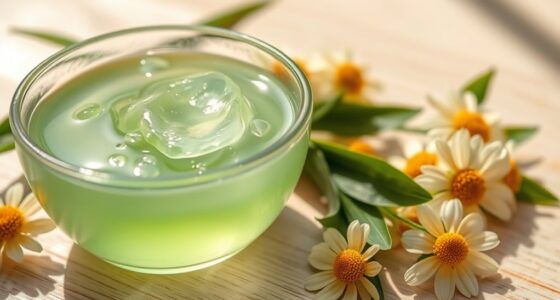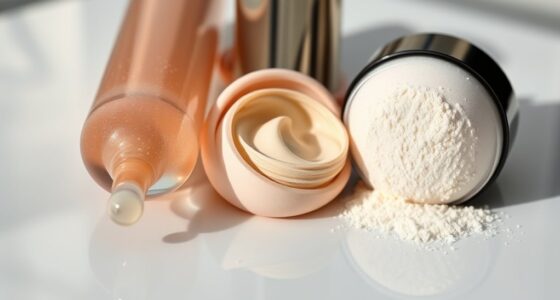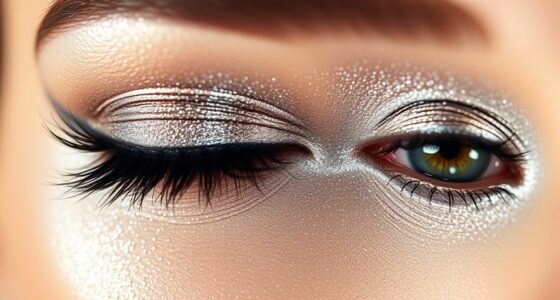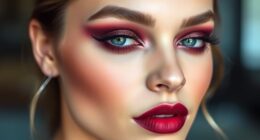Incorporating scalp care into your beauty routine is key to achieving healthy, vibrant hair. Use gentle shampoos suited to your scalp type and avoid over-washing to keep natural oils balanced. Regular scalp massages and nourishing treatments help improve blood flow and prevent issues like dandruff and dryness. Maintaining good hydration and managing stress also support scalp health. Keep exploring for more tips to discover the full potential of your scalp and hair.
Key Takeaways
- Incorporate gentle, scalp-specific shampoos suited to your scalp type to maintain cleanliness without stripping natural oils.
- Regularly use nourishing scalp treatments or masks with ingredients like tea tree oil to prevent dandruff and promote health.
- Avoid over-washing; balance cleansing with moisture retention to prevent dryness, irritation, and buildup.
- Incorporate scalp massages during washing to stimulate blood flow and loosen dead skin cells for a healthier scalp.
- Support scalp health through a balanced diet, hydration, and stress management for optimal hair growth and vitality.
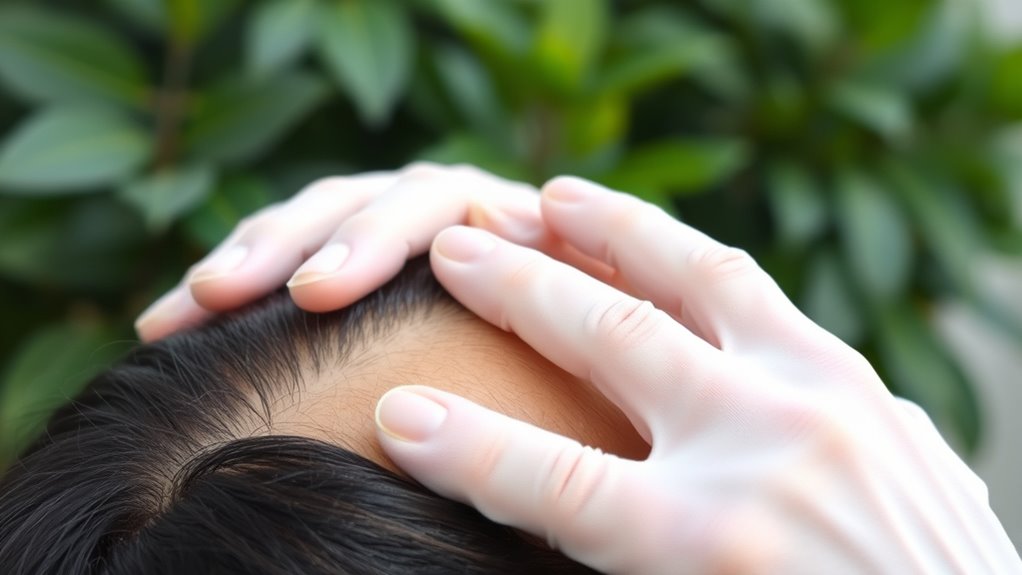
Have you ever wondered how healthy your scalp really is? It’s easy to overlook, but your scalp plays a essential role in your overall hair health and appearance. A well-maintained scalp promotes hair growth and helps prevent common issues like dandruff. When your scalp is nourished and balanced, your hair can grow thicker, stronger, and shinier. On the other hand, neglecting scalp care can lead to dryness, irritation, and even hair loss over time. That’s why integrating scalp care into your beauty routine isn’t just a trend—it’s a necessity for vibrant, healthy hair.
Your scalp’s health is key to vibrant, strong hair—don’t overlook its care for lasting beauty.
The foundation of good scalp care starts with understanding your scalp’s needs. If you notice flakiness, itchiness, or greasy patches, it’s time to adapt your routine. Regular cleansing is essential, but you want to choose shampoos that suit your scalp type. For example, if you have a dry scalp, opt for moisturizing formulas that won’t strip away natural oils. For oily or dandruff-prone scalps, look for products containing ingredients like salicylic acid or zinc pyrithione, which combat excess oil and help prevent dandruff. When you wash your hair, massage your scalp gently with your fingertips. This stimulates blood flow, encouraging better hair growth and helping to loosen buildup that can clog hair follicles. Proper scalp cleansing is vital for maintaining a healthy environment for hair to thrive.
Incorporating scalp masks or treatments can give your scalp an extra boost. These products often contain nourishing ingredients like tea tree oil, which has antimicrobial properties that help prevent dandruff and scalp infections. Using such treatments weekly can keep your scalp clean, balanced, and healthy. Remember, a healthy scalp is less prone to flakiness and irritation, and it creates the ideal environment for hair to grow strong. Additionally, avoid over-washing, which can strip your scalp of natural oils and cause dryness or irritation. Striking a balance is key—wash regularly enough to keep your scalp clean but not so often that you disrupt its natural moisture barrier.
Another important aspect is your lifestyle. Staying hydrated and eating a balanced diet rich in vitamins like biotin and vitamin E supports overall scalp health. Stress management also plays a role, as chronic stress can lead to scalp issues and hair thinning. Using gentle hair care products free from harsh chemicals can further protect your scalp from damage. When you adopt these habits, you’re not just maintaining your hair’s appearance; you’re actively nurturing your scalp, which in turn promotes healthy hair growth and helps prevent dandruff. Over time, these small but consistent steps can make a noticeable difference in the health and vitality of your hair, ensuring your scalp remains a strong foundation for your beauty.
Frequently Asked Questions
How Often Should I Wash My Scalp?
You should wash your scalp about two to three times a week to maintain ideal scalp hygiene without stripping natural oils. If you have oily hair or exercise frequently, consider washing more often; if your scalp is dry, less frequent washing helps. Pay attention to how your scalp responds, and adjust your hair washing routine accordingly. Consistent scalp care keeps your hair healthy and shiny.
Can Scalp Treatments Prevent Hair Loss?
Yes, scalp treatments can help prevent hair loss by improving scalp health. When you use targeted treatments, they stimulate hair follicles, reduce inflammation, and prevent clogged pores, all of which support strong, healthy hair growth. Incorporate scalp massages, nourishing serums, or medicated treatments into your routine regularly. This proactive approach boosts your hair loss prevention efforts, keeping your scalp healthy and your hair fuller over time.
Are Natural Oils Better Than Commercial Products?
Natural oils are often like a gentle breeze, nourishing your scalp with pure, botanical goodness. They can be more effective and gentle than commercial products, which might contain harsh chemicals. While natural oils, such as coconut or jojoba, provide deep hydration and balance, commercial products may offer convenience and targeted ingredients. Ultimately, choosing depends on your scalp’s needs, but natural oils often deliver a more holistic, less invasive approach.
How Do I Know if My Scalp Is Healthy?
You can tell your scalp is healthy if it feels balanced, not overly dry or oily, and shows no signs of irritation. Check for proper scalp pH balance—if it’s too acidic or alkaline, it may cause sensitivity or dandruff. Notice if your scalp is sensitive or reacts easily to products; healthy skin usually isn’t prone to redness or itching. Regularly observe these signs to keep your scalp in good condition.
Can Scalp Scrubbing Damage My Hair?
Yes, scalp scrubbing can damage your hair if you have scalp sensitivity or use incompatible products. Aggressive scrubbing may cause irritation, redness, or even hair breakage. To avoid this, choose gentle, compatible scrubs and limit how often you do it. Always pay attention to your scalp’s response and adjust your routine accordingly. Properly caring for your scalp helps maintain healthy hair without risking damage.
Conclusion
By now, you realize that caring for your scalp isn’t just a small detail—it’s the secret to revealing your hair’s full potential. When you give your scalp the attention it deserves, you’re not just maintaining beauty; you’re nourishing the very foundation of your confidence. Think of scalp care as the crown jewel of your routine, transforming your hair from mere strands to a stunning cascade. Embrace it, and watch your beauty shine brighter than ever before.


